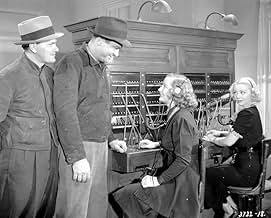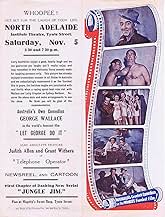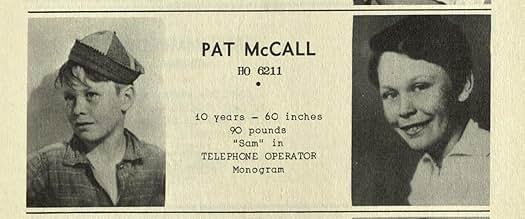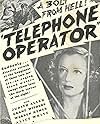A telephone operator covering for a friend's "fling" finds herself in the middle of a major disaster when the city is hit by a big flood and her switchboard is the center of communications.A telephone operator covering for a friend's "fling" finds herself in the middle of a major disaster when the city is hit by a big flood and her switchboard is the center of communications.A telephone operator covering for a friend's "fling" finds herself in the middle of a major disaster when the city is hit by a big flood and her switchboard is the center of communications.
Ronnie Cosby
- Ted Molloy
- (as Ronnie Cosbey)
Dorothy Vaughan
- Mrs. Molloy
- (as Dorothy Vaughn)
Lynton Brent
- Ranger in Radio Cabin
- (uncredited)
Jack 'Tiny' Lipson
- Counterman
- (uncredited)
Pat McCall
- Sam
- (uncredited)
Lafe McKee
- Campbell's Watchman
- (uncredited)
- Director
- Writers
- All cast & crew
- Production, box office & more at IMDbPro
Featured reviews
Grant Withers and Warren Hymer are two tough line men for the company. They come to Riverdale, where they set their sights on operators Judith Allen and Alice White.
Given director Scott Pembroke's grounding in comedy -- he was the director of Stan Laurel's burlesques of big hits, like RUPERT OF HEEHAW and DOCTOR PYCKLE AND MISTER PRYDE, you'd think the comedy bits in this early Monogram would be better; well, Miss White is pretty good, but the other actors are rather lugubrious. Until the big finale, it's all tough guys in leather jackets and fedoras pounding on each other, and slow-and-steady progress in the romantic plots.
The big set piece is the flood, and that's handled using stock footage of floods and ranks of telephone operators standing at their boards, while voice-overs tell people "There's a flood. Tell your neighbors." Oh, so that's why the third floor of my house is underwater?
Actually it's a decent movie until that repeated voice-over. Not bad for a Poverty Row Second Feature. Withers is typically fine. t's just that the finale goes on too long.
Given director Scott Pembroke's grounding in comedy -- he was the director of Stan Laurel's burlesques of big hits, like RUPERT OF HEEHAW and DOCTOR PYCKLE AND MISTER PRYDE, you'd think the comedy bits in this early Monogram would be better; well, Miss White is pretty good, but the other actors are rather lugubrious. Until the big finale, it's all tough guys in leather jackets and fedoras pounding on each other, and slow-and-steady progress in the romantic plots.
The big set piece is the flood, and that's handled using stock footage of floods and ranks of telephone operators standing at their boards, while voice-overs tell people "There's a flood. Tell your neighbors." Oh, so that's why the third floor of my house is underwater?
Actually it's a decent movie until that repeated voice-over. Not bad for a Poverty Row Second Feature. Withers is typically fine. t's just that the finale goes on too long.
This potboiler B film from Monogram is a salute to that unsung group of heroines, the telephone switchboard operators. And for a product coming from Monogram Pictures this thing was a piece of cinematic art.
Grant Withers and Warren Hymer are a pair of telephone linemen who arrive in town on a new assignment and find romance with switchboard operators Judith Allen and Alice White. It's a bit of rough going with Withers and Allen and even rougher going with Withers and new boss Pat Flaherty.
And Flaherty has his own problems with a young wife out stepping with the engineer in charge of the local dam Cornelius Keefe. For reasons only explained that Flaherty is such a nice guy all of them try to protect him from the scandal and all of them get in trouble because of it.
Everyone's problems gets washed away when Keefe's dam bursts in a flood. At that point Allen and White are a pair of heroines keeping the switchboard open as a center of communication as the flood waters rise.
For a Monogram Picture the editing of newsreel flood footage into the film is nicely done as that studio did not have a true special effects department. In fact it will stand up to several of the major studios in terms of how good it was.
Not a bad B picture and for Monogram it was great art.
Grant Withers and Warren Hymer are a pair of telephone linemen who arrive in town on a new assignment and find romance with switchboard operators Judith Allen and Alice White. It's a bit of rough going with Withers and Allen and even rougher going with Withers and new boss Pat Flaherty.
And Flaherty has his own problems with a young wife out stepping with the engineer in charge of the local dam Cornelius Keefe. For reasons only explained that Flaherty is such a nice guy all of them try to protect him from the scandal and all of them get in trouble because of it.
Everyone's problems gets washed away when Keefe's dam bursts in a flood. At that point Allen and White are a pair of heroines keeping the switchboard open as a center of communication as the flood waters rise.
For a Monogram Picture the editing of newsreel flood footage into the film is nicely done as that studio did not have a true special effects department. In fact it will stand up to several of the major studios in terms of how good it was.
Not a bad B picture and for Monogram it was great art.
This movie highlights the efforts of telephone operators in warning people when the Riverdale Dam breaks. Withers and Hymer play two linesmen (the best there ever were as they tell everybody) were sent to the town to string more lines by the dam. I disliked this movie almost from the beginning and finished watching it only to see if I could revise my early opinion. Another reviewer refers to the chronic sexual harassment in the movie and that it might ruffle a few feathers. The arrogant, overbearing lout played by Withers is thoroughly obnoxious. Early in the movie at a dance, Withers grabs Judith Allen who cries out in pain and asks him to let her go. He won't until another man comes along (who Withers ends up socking - what a guy). Evidently this abusive behavior was acceptable in the 1930s, so the audience would not have been surprised that Withers and Allen end up falling in love and saving the day. There were two good things about this movie, 1) the cute kid and 2) the flood footage. Oh, there's a third good thing – many minutes of this film are missing and it's now only 53 minutes long.
I lived through the great flood in the San Fernando Valley of 1937. I even have some 16 mm home movies that my dad took in the big flood basins that now have the flood control dams. As I see this movie, I see what may be scenes from the same disaster. After all, I am sure that the studios in the area had lots of cameramen out taking movies for possible, and here is one, movies that could use those background scenes. The city scenes could easily have been the streets in Van Nuys and the fast flowing water along the Los Angeles River, which at that time was not the pretty looking concrete channel that it is now in the 2000's. We even have a movie showing a Whippet automobile in the flooded area; we jokingly remark that it was a bigger car and that it had shrunk in the flood.
I have to put it down to personal misfortune that I watched a chopped up copy, with voices cut off in mid-sentence and abrupt changes of scenario - but, in spite of those shortcomings (which some rate 'dated' and 'old' because they are rooted in the present), I still found it arresting enough to watch it to the final frame.
Direction by Scott Pembroke (about whom I know nothing) is quite good, as is the script brimming with funny situations and sharp one-liners as a number of men try to win over a gorgeous telephone operator nicely played by stunning Judith Allen... and suddenly Riverdale Dam bursts open and all hell breaks loose as Allen goes to the switchboard to convey warnings, save lives... and be proposed marriage! 6/10.
Direction by Scott Pembroke (about whom I know nothing) is quite good, as is the script brimming with funny situations and sharp one-liners as a number of men try to win over a gorgeous telephone operator nicely played by stunning Judith Allen... and suddenly Riverdale Dam bursts open and all hell breaks loose as Allen goes to the switchboard to convey warnings, save lives... and be proposed marriage! 6/10.
Did you know
- TriviaThe earliest documented telecast of this film took place in New York City Friday 5 May 1950 on the Night Owl Theatre on WPIX (Channel 11).
Details
- Release date
- Country of origin
- Language
- Also known as
- Pelo Telefone
- Production company
- See more company credits at IMDbPro
- Runtime1 hour 10 minutes
- Color
- Aspect ratio
- 1.37 : 1
Contribute to this page
Suggest an edit or add missing content


















